|
De Griekse dichter en schrijver Níkos Kazantzákis werd geboren in Heraklion op 18 februari 1883. Zie ook alle tags voor Níkos Kazantzákis op dit blog.
Uit: The Odyssey (Vertaald door Kimon Friar)
O Sun, my quick coquetting eye, my red-haired hound,
sniff out all quarries that I love, give them swift chase,
tell me all that you've seen on earth, all that you've heard,
and I shall pass them through my entrails' secret forge
till slowly, with profound caresses, play and laughter,
stones, water, fire, and earth shall be transformed to spirit,
and the mud-winged and heavy soul, freed of its flesh,
shall like a flame serene ascend and fade in sun.
You've eaten and drunk well, my lads, on festive shores,
until the feast within you turned to dance and laughter,
love-bites and idle chatter that dissolved in flesh;
but in myself the meat turned monstrous, thewine rose,
a sea-chant leapt within me, rushed to knock me down,
until I longed to sing this song- make way, my brothers!
Oho, the festival lasts long, the place is small;
make way, let me have air, give me a ring to stretch in,
a place to spread my shinbones, kick up my heels,
so that my giddiness won't wound your wives and children.
As soon as I let my words loose along the shore
to hunt all mankind down, I know they'll choke my throat,
and when my full neck smothers and my pain grows vast
I shall rise up- make way!- to dance on raging shores.
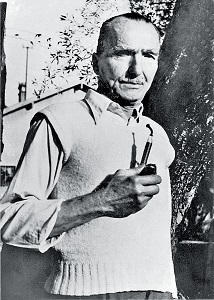
Níkos Kazantzákis (18 februari 1883 - 26 oktober 1957)
De Amerikaanse schrijfster Jean Marie Auel werd geboren op 18 februari 1936 in Chicago. Zie ook alle tags voor Jean M. Auel op dit blog.
Uit: Het lied van de grotten (Vertaald door Henny van Gulik en Ingrid Tóth)
“Ayla en Jondalar liepen achteraan in de stoet, met achter zich drie paarden, en ze keken op om te zien wat de oorzaak van het oponthoud was. ‘Ik vraag me af waarom we halt houden,’ zei Jondalar, met een zorgelijke frons.
Ayla keek nauwlettend naar de leider en de mensen die om hem heen stonden en bracht instinctief haar hand beschermend naar het warme bundeltje in de zachte leren draagdoek op haar buik. Jonayla had pas de borst gekregen en sliep, maar ze bewoog even bij de aanraking van haar moeder. Ayla had een buitengewoon vermogen om lichaamstaal te lezen, dat had ze op jonge leeftijd geleerd toen ze bij de Stam leefde.
Ze wist dat Joharran verontrust was en Th efona bang. Ayla had ook een uitzonderlijk scherp gezichtsvermogen. Daarbij kon ze geluiden horen die boven het bereik van het menselijk gehoor lagen, en de diepe tonen voelen van de geluiden daaronder. Haar reuk- en smaakzin waren eveneens buitengewoon scherp, maar ze had zich nooit met iemand vergeleken en besefte dus niet hoe bijzonder haar waarnemingen waren. Ze was geboren met uiterst fi jngevoelige zintuigen, wat ongetwijfeld had bijgedragen tot haar kans op overleving nadat ze op haar vijfde haar ouders en alles wat haar vertrouwd was had verloren.
Al haar kennis had ze opgedaan uit het leven zelf. Ze had haar aangeboren vaardigheden ontwikkeld gedurende de jaren dat ze dieren had bestudeerd, met name carnivoren, toen ze zichzelf had leren jagen. In de stilte bespeurde ze de nauwelijks waarneembare, maar vertrouwde bromgeluiden van leeuwen. Ze rook in een zachte bries hun kenmerkende geur, en ze zag dat verschillende mensen vooraan in de groep naar voren keken. Toen ze hun blik volgde, zag ze iets bewegen. Plotseling leken de katten in het hoge gras scherp in beeld te komen. Ze onderscheidde nu twee jonge en drie of vier volwassen holenleeuwen.
Terwijl ze naar voren liep ging haar ene hand naar haar speerwerper die aan een lus aan haar riem hing, en met de andere pakte ze een speer uit de houder op haar rug.
‘Waar ga je heen?’ vroeg Jondalar.”
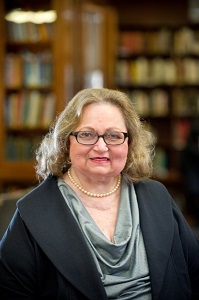
Jean M. Auel (Chicago, 18 februari 1936)
De Hongaarse schrijver en journalist Mór Jókai werd geboren op 18 februari 1825 in Komárom. Zie ook alle tags voor Mór Jókai op dit blog.
Uit: The Baron’s Sons (Vertaald door Percy Favor Bicknell)
“The final words of this peroration were drowned in a storm of cheers, an outburst of music, and the confused din caused by the pushing back of chairs and the dashing of wine-glasses against the wall, while the guests fell into one another’s arms in an ecstasy of enthusiasm.
“Long life to him!” they cried; “may he live a thousand years!”
He to whom the assembled company wished so long a life was the renowned and honoured Baron Casimir Baradlay, lord lieutenant of his county, the owner of large estates, and the leader of a powerful party. The high dignitaries assembled about his hospitable board had gathered from far and near to determine upon a programme which should ensure their country’s welfare for the coming years. As a fitting close to this important conference, Baron Baradlay was treating his partisans to a banquet in the great hall of his castle, and in the unavoidable absence of the host himself his wife was presiding at the festive board. The administrator, however, Benedict Rideghváry, had taken the absentee’s place at the conference.
At the close of the toast, when those near the head of the table turned to touch glasses with the hostess, her absence was noticed, and the butler who stood behind her empty chair explained that the physician had just entered and whispered something in the lady’s ear, whereupon she had left the room. Probably, said he, her husband had sent for her. Upon this information a number of the guests made anxious inquiry whether their honoured host was seriously ill; and the administrator hastened to reassure all present, as far as his voice could reach down the long table, by telling them that it was merely a return of the baron’s chronic ailment. Some of the better-informed supplemented this announcement by explaining to their neighbours that the gentleman had, for perhaps ten years, been subject to frequent attacks of heart-failure, but could nevertheless, by observing very regular habits, be expected to live for another ten years or more.”
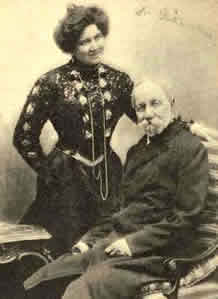
Mór Jókai (18 februari 1825 – 5 mei 1904)
Hier met zijn tweede vrouw Bella Nagy
De Duitse schrijfster Hedwig Courths-Mahler werd geboren in Nebra (Saksen-Anhalt) op 18 februari 1867. Zie ook alle tags voor Hedwig Courths-Mahler op dit blog.
Uit: Ich lieb' in dir die ganze Welt
„Graf Lothar seufzte. „Ja, Baroness, auf Rosen sind wir hier nicht gebettet. Und das wird in Zukunft sogar noch schlimmer werden. Der Treubruch seiner Frau hat Rüdiger noch griesgrämiger gemacht. Wir werden hier ein Leben in Sack und Asche führen müssen.“
„Ich wollte, ich könnte Sie davon erlösen. Wenn ich könnte, wie ich wollte, würde ich, noch ehe Graf Rüdiger heimkommt, meine Sachen packen und nach Rottberg fahren. Sie müssten mich dann begleiten, und wir würden froh und vergnügt sein.“
Graf Lothar sah ihr mit einem tiefen Blick in die Augen. „Das klingt wie ein schönes Märchen, in dem eine gute Fee zwei Geschwister von einem bösen Zauber erlöst.“
„Ja, liebe Annedore“, sagte nun auch die Komtess, „wunderschön wäre das! Sie sind so gut und haben ein edles, empfängliches Herz.“
Annedore wurde verlegen. „Das müssen Sie nicht sagen. Ich bin gar nicht gut und edel, sondern oft recht trotzig und unliebenswürdig. Nur wen ich gern habe, der hat es leicht mit mir.“
Graf Lothar fasste ihre Hand. „Wenn ich doch zu den Menschen gehörte, die Sie gern haben!“
Errötend zog Annedore ihre Hand zurück. „Ganz sicher gehören Sie dazu, Graf Lothar, und Lilly auch. Sie haben es mir so leicht gemacht durch Ihr freundliches Entgegenkommen. Es musste ja nach Ihren Beschreibungen ganz schrecklich in Lindeck sein unter Graf Rüdigers Herrschaft.“
„Nun, schließlich hat ja Rüdiger auch manche gute Seiten“, erwiderte Graf Lothar in lauer Verteidigung, nur um sich den Anschein des Edelmuts zu geben.
Annedores Augen leuchteten warm in die seinen. „Es ehrt Sie, Graf Lothar, dass Sie trotz allem, was Ihr Bruder Ihnen angetan hat, noch für ihn eintreten.“
Einen Moment sah Graf Lothar ein wenig verlegen vor sich hin. Die ehrlichen Mädchenaugen genierten ihn. Doch solche Gefühle waren in seiner Situation vollkommen fehl am Platz …“
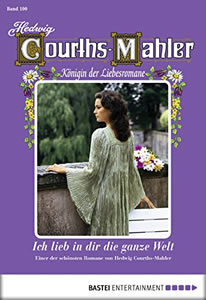
Hedwig Courths-Mahler (18 februari 1867 - 26 november 1950)
Cover
De Noorse schrijver Alexander Lange Kielland werd geboren in Stavanger op 18 februari 1849. Zie ook alle tags voor Alexander Kielland op dit blog.
Uit: Tales of Two Countries (Vertaald door William Archer)
“It was not difficult to obtain control of her, as she belonged to no one. He gave her a name, and placed her in one of the best convent schools. Before long her benefactor had the satisfaction of observing that the seeds of evil died away and disappeared. She developed an amiable, rather indolent character, correct and quiet manners, and a rare beauty.
When she grew up he married her. Their married life was peaceful and pleasant; in spite of the great difference in their ages, he had unbounded confidence in her, and she deserved it.
Married people do not live in such close communion in France as they do with us; so that their claims upon each other are not so great, and their disappointments are less bitter.
She was not happy, but contented. Her character lent itself to gratitude. She did not feel the tedium of wealth; on the contrary, she often took an almost childish pleasure in it. But no one could guess that, for her bearing was always full of dignity and repose. People suspected that there was something questionable about her origin, but as no one could answer questions they left off asking them. One has so much else to think of in Paris.
She had forgotten her past. She had forgotten it just as we have forgotten the roses, the ribbons, and faded letters of our youth—because we never think about them. They lie locked up in a drawer which we never open. And yet, if we happen now and again to east a glance into this secret drawer, we at once notice if a single one of the roses, or the least bit of ribbon, is wanting. For we remember them all to a nicety; the memories are as fresh as ever—as sweet as ever, and as bitter.
It was thus she had forgotten her past—locked it up and thrown away the key.
But at night she sometimes dreamed frightful things. She could once more feel the old witch with whom she lived shaking her by the shoulder, and driving her out in the cold mornings to work at her artificial flowers.”
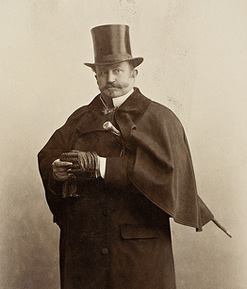
Alexander Kielland (18 februari 1849 - 6 april 1906)
De Afro-Amerikaanse schrijfster, dichteres en lesbisch-feministische, anti-racistische activiste Audre Geraldine Lorde werd geboren op 18 februari 1934 in New York. Zie ook alle tags voor Audre Lorde op dit blog.
Father Son and Holy Ghost
I have not ever seen my father’s grave.
Not that his judgment eyes
have been forgotten
nor his great hands’ print
on our evening doorknobs
one half turn each night
and he would come
drabbled with the world’s business
massive and silent
as the whole day’s wish
ready to redefine
each of our shapes
but now the evening doorknobs
wait and do not recognize us
as we pass.
Each week a different woman
regular as his one quick glass
each evening
pulls up the grass his stillness grows
calling it weed.
Each week a different woman
has my mother’s face
and he
who time has changeless
must be amazed
who knew and loved
but one.
My father died in silence
loving creation
and well-defined response
he lived still judgments
on familiar things
and died knowing
a January 15th that year me.
Lest I go into dust
I have not ever seen my father’s grave.
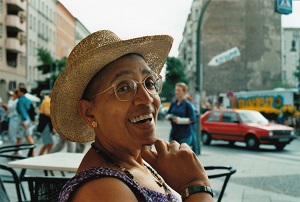
Audre Lorde (18 februari 1934 – 17 november 1992)
De Amerikaanse schrijver Wallace Stegner werd geboren op 18 februari 1909 in Lake Mills, Iowa. Zie ook alle tags voor Wallace Stegner op dit blog.
Uit: Wat behouden blijft (Vertaald door Edzard Krol)
“Terwijl ik uit verwarrende dromen en herinneringen naar boven kom, slingerend als een forel opduik door de kringen van eerdere stijgingen, bereik ik het oppervlak. Mijn ogen gaan open. Ik ben wakker.
Mensen die lijden aan grauwe staar zullen na afloop van de operatie, als het verband wordt verwijderd, iets dergelijks zien: elk detail heeft de scherpte van iets wat voor het eerst wordt waargenomen, toch is het ook bekend, van de tijd die aan de blindheid voorafging, het herinnerde en het waargenomen beeld vallen samen als in een stereoscoop.
Het is duidelijk nog heel vroeg. Het licht dat door de kieren van de jaloezieën lekt, is niet meer dan een schemering. Maar ik zie, of herinner me, of beide, de gordijnloze ramen, de kale dakspanten, de houten wanden die leeg zijn, op een kalender na, die er acht jaar geleden geloof ik ook hing, toen we hier voor het laatst waren.
Wat ooit opvallend spartaans was, is nu sjofel. Sinds Charity en Sid het terrein aan de kinderen hebben overgedragen, is er niets bij gekomen of opgeknapt. Ik zou het gevoel moeten hebben wakker te worden in een goedkoop hotelletje in crisistijd, maar dat is niet het geval. Ik heb te veel goede dagen en nachten in dit huisje doorgebracht om mij er ontmoedigd door te voelen.
Als mijn ogen zich aan de schemering hebben aangepast en ik mijn hoofd van het kussen til om rond te kijken, is er iets wonderbaarlijk geruststellends, behaaglijks aan de kamer, zelfs in het halfduister. Door de associaties wellicht, maar ook door de kleur.
In de loop van de jaren is het onafgewerkte grenen van de wanden en plafonds verzacht tot een rijke honingkleur, alsof ze geverfd zijn door de warmte van de mensen die er een wijkplaats voor hun vrienden van maakten. Ik vat het op als een voorteken; en hoewel ik mezelf eraan herinner waarom we hier zijn, kan ik het heerlijke gevoel van vertrouwdheid waarmee ik zojuist wakker werd niet van me afschudden.”
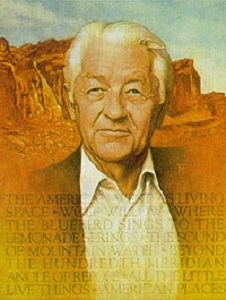
Wallace Stegner (18 februari 1909 – 13 april 1993)
De Italiaanse dichter en schrijver Leone Battista Alberti werd geboren in Genua op 18 februari 1404. Zie ook alle tags voor Leone Battista Alberti en voor Leone Alberti op dit blog.
Uit: On Painting (Vertaald door Cecil Grayson)
“I used to marvel and at the same time to grieve that so many excellent and superior arts and sciences from our most vigorous antique past could now seem lacking and almost wholly lost. We know from [remaining] works and through references to them that they were once widespread. Painters, sculptors, architects, musicians, geometricians, rhetoricians, seers and similar noble and amazing intellects are very rarely found today and there are few to praise them. Thus I believed, as many said, that Nature, the mistress of things, had grown old and tired. She no longer produced either geniuses or giants which in her more youthful and more glorious days she had produced so marvelously and abundantly.
Since then, I have been brought back here [to Florence]from the long exilein which we Alberti have grown old into this our city, adorned above all others. I have come to understand that in many men, but especially in you, Filippo, and in our close friend Donato the sculptor and in others like Nencio, Luca and Masaccio, there is a genius for [accomplishing] every praiseworthy thing. For this they should not be slighted in favor of anyone famous in antiquity in these arts. Therefore, I believe the power of acquiring wide fame in any art or science lies in our industry and diligence more than in the times or in the gifts of nature. It must be admitted that it was less difficult for the Ancients--because they had models to imitate and from which they could learn to come to a knowledge of those supreme arts which today are most difficult for us. Our fame ought to be much greater, then, if we discover unheard-of and never-before-seen arts and sciences without teachers or without any model whatsoever.”
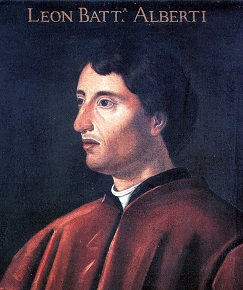
Leone Battista Alberti (14 februari 1404 — 25 april 1472)
Florentijnse school, 1e helft 17e eeuw
18-02-2017 om 11:44
geschreven door Romenu 
Tags:Níkos Kazantzákis, Jean M. Auel, Mór Jókai, Hedwig Courths-Mahler, Alexander Kielland, Audre Lorde, Wallace Stegner, Leone Battista Alberti, Romenu
|

